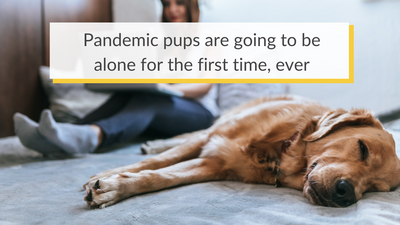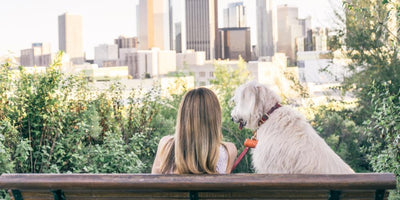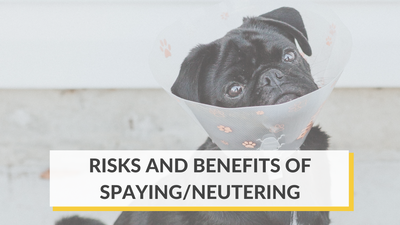Do you ever wonder what your puppy is up to while you’re at work? Leaving your dog alone while at work is no fun for anyone—neither you nor your furbaby. However, it may be necessary if you need to work to pay the bills and the dog food. If you have a puppy and are working full time right now, here are 6 advice you might want to consider to make it all work:
1) Take a look at your work situation
Before you start developing a game plan for your new puppy, it’s important that you assess your work situation. Here are a few sample questions you should ask yourself before bringing a puppy into your life.
Review your options and see whether you can spend more time at home with your newest family member. You might want to create a system where you don’t leave your puppy alone all at once. Spend the first few days at home with your new family member and introduce “alone” time gradually. Head out for a few minutes, then an hour and then longer. Don’t just get a puppy and leave them alone for a few hours right away. At the very least, get your puppy on a weekend so you have some time together. If you can’t get time away from work, get a friend or family member to spend extended periods of time with your pup in your home at first, until your new furry pal gets used to longer periods alone.

2) Create a space for your puppy
One of the most important things that a new puppy parent can do is to provide him with a sense of security. This starts with giving him his own space, around 6X4 feet is ideal. Many people use a puppy-pen but you can use a spare bedroom or even your bathroom. It’s best to give your puppy space and gradually expand. The space should have a few crucial pet supplies including a comfortable bed, a few toys and something with your scent on it — old clothing works great. Pups tend to like den-like environments, so a cozy, smaller space is best. Building a good space for your pup can aid in potty training since dogs will avoid going to the bathroom near their dens or home spaces.
3) Leaving your puppy alone during the day
The general consensus for leaving a puppy alone during the day is one hour for every month, a two-month-old puppy will rarely be capable of holding his bladder for more than two hours, a three-month-old for three…etc. This is a generalization but it’s a good starting point to help you build your new dog-friendly schedule. Puppy pads are a common back-up plan for new puppy parents and it won’t hurt to lay some down in his area. Just don’t be too surprised if your puppy sees them as a fun thing to shred rather than a place to relieve himself!
3) Monitor your puppy
Even if your dog is old enough to be left alone, make sure you can monitor them easily. What if your pup has separation anxiety, a barking problem or runs into trouble while you’re away? Your dog monitoring devices can be a home security camera, a baby camera, or pet specific monitoring camera. Furbo Dog Camera is an engaging tool that helps you see, talk, and play with your dog remotely on mobile. Through the two-way communication system, you can speak to your dog anytime to soothe separation anxiety or stop bad behaviour. Use the free app to check in your dog at any time of the day or night. The HD, night vision camera lets you see clearly and a dog alert notification system allows you to get an alert whenever your dog barks, so you can keep track of barking and be alerted if your pup is in distress. You can even take photos and videos if you need to discuss a specific behavior with a trainer or vet. The free app also lets you control the video, photos and treat dispenser, so you can use these features anywhere where you have access to your phone. Furbo makes a clicking noise before dispensing a treat, making it ideal for use with clicker training.

4) Keep your pup busy
A bored pup can easily become distressed on their own, especially since their biggest source of entertainment and fun (you!) isn’t around. Leave out puzzles, toys and other things to keep your puppy busy. A treat which is frozen and requires your puppy to work for a snack can be a good way to distract them for hours. Consider having a special treat they love only available when you leave, so your dog associates something positive with the time you’re away. Check out your local pet store or favorite dog online shops to find interactive toys to keep your pup busy!
5) Leave quietly
If you must leave your dog at home alone throughout the day, it’s best that you leave quietly without making a dramatic exit. To properly house train your dog, leave quietly without making any lavish displays of affection. Challenging I know, but the less emphasis placed on your departures and arrivals the happier and better adjusted your puppy will be. It’s a life-long habit that you should try to form early as it not only cuts down on accidents it cuts down on separation anxiety, which is the most common root of behavioral disorders in dogs.
6) Give your puppy attention and a chance to cut loose when you get home
What you do when you’re home is just as important as what you do before and during your work day, to make sure your furry family member is okay with being left alone. When you come home, praise your pup, take them out for a walk and heap them with praise. Give them love and be sure to spend time with them. The time you have at home is also time you can spend training the “quiet” command and other commands so your pup is ready to be quiet when you’re gone. Extra time and love can also help make up for the time spent alone, so even if you bring work home it’s important to set aside some time for training as well as fun. Be sure to spend plenty of time socializing your puppy, too. Time spent with other dogs and in dog parks can help your dog adapt better to time alone. A poorly-socialized dog who spends all his or her time alone may be more prone to problem barking and anxiety, so make sure your fur baby has an active social life!

Got that all down? Raising a puppy can be a sweet but frustrating experience for new dog parents, especially for those working full-time. The most important thing to remember is to be patient and spend time with your pup in training. With the right training and positive reinforcement, your puppy will easily adjust to their new home. Don’t be disappointed if your puppy needs more time settling down than others, every dog is different. At the end of the day, there are no untrainable dogs, just untrained humans!












